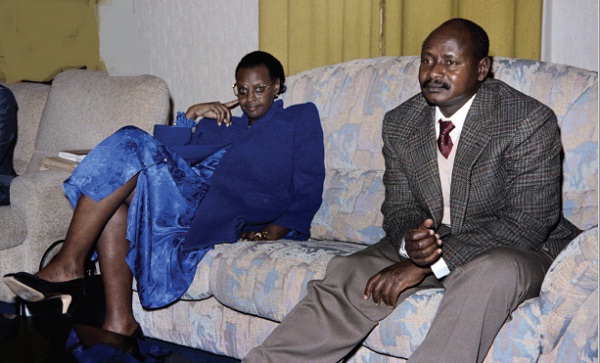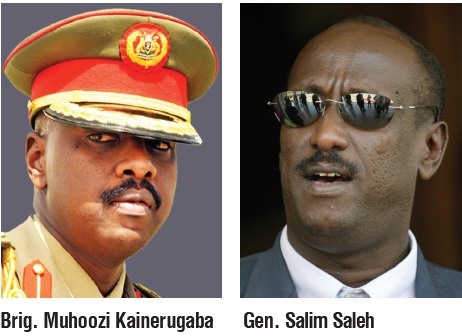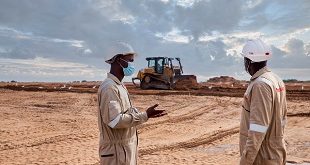“Trump is a loose cannon; he is someone who may remove gloves and break away from the orthodox way of doing things which may change the situation for some geo-political players like Museveni,” he told The Independent.
Lukwago steered clear of discussing the implications for Museveni if it is Democratic contender Hillary Clinton in the White House next January. Clinton has done business with Museveni before and could be more accommodating. But Lukwago makes another important point about Museveni’s fading muscle-man role for America in the Great Lakes region.
In March, U.S. Ambassador to the UN, Samantha Power while at a UN Security Council Meeting, described Museveni as a threat to Uganda’s stability for his long stay in power. A few weeks later on April 8, The Washington Post in an editorial advised the U.S. government to revisit its approach towards Uganda writing that: “lavish security assistance from the United States may be helping to enable an environment of increasing repression in Uganda, and sending the message to other African nations that trampling on rights is permissible so long as the country remains a U.S. counterterrorism ally.”
To this Museveni bashing abroad, Lord Mayor Lukwago adds a regional dimension.
The dust is settling in South Sudan and our role in Somalia is being evaluated a lot,” he says, “Western powers may ditch Museveni because his relevance has always been about conflicts but that is not sustainable”. The UPDF commands acclaim on the continent for its missions in Central African Republic, (CAR), Somalia and South Sudan.
Even if the UPDF, with American support withdrawn as Lukwago predicts, fails to find work abroad, it will have enough at home. Soon after the Feb.18 general elections, Museveni – with an AK47 slung over his shoulder – was seen leading platoons of the UPDF in quelling unrest that erupted in the western border region of the Rwenzori that left over 50 civilians dead. It is not clear how long Museveni can keep jumping over ravines, dodging bullets, and leading his army from the front. Like his Zimbabwean counterpart, Robert Mugabe; Museveni could still be president when he is 90 years old. Mugabe, however, cannot go up or down a stair without help.

Family politics
With the army remaining key to Museveni’s consolidation of his grip on power, his son, Brig. Muhoozi Kainerugaba, who commands the elite Special Forces Group under which is the Presidential Guard Brigade, will have to play a stronger frontal role. Although Muhoozi was a 12-year old when his father took power in 1986, he will be a greying 49-year old in 2021 and will – perhaps – have dreams of his own. Museveni’s other point man in the army, his younger brother, Gen. Caleb Akandwanaho aka Salim Saleh is now 56-years old. Saleh has cultivated an enigmatic personality with a stealth knack of popping up wherever his brother posts him.
Gen. David Sejusa insists Museveni is plotting to have his son, Brig. Muhoozi, succeed him. Sejusa even claimed that Museveni had hatched a plot to eliminate all opposition to Muhoozi’s succession
If Salim Saleh, Muhoozi, and Janet Museveni move closer to the centre in the next government, some prominent personalities today might have to step back. One of the most prominent is the Inspector General of Police (IGP), Kale Kayihura. The IGP is a brainy, tenacious, hardnosed officer who has encapsulated his job into a single mission: the preservation of Museveni in power. To achieve that, Kayihura has consolidated under his power all the security agencies and emerged as the third most powerful person in the country after Museveni and Janet. He has used that power to ensure that opposition leader and former FDC presidential candidate Kizza Besigye does not breathe.
Although Salim Saleh, Muhoozi, and Janet Museveni might also aim to preserve Museveni in power, they might be more comfortable working with another person other than Kayihura to ensure that. Their choice might be Lt. Gen. (Retired) Henry Tumukunde. As brainy and hardened as Kayihura, Tumukunde wields more powerful family connections to the centre of power. What is not clear is if he has the organisational ability to cope with the demands of keeping the myriad opponents to Museveni in check.

Already, Besigye has drawn the battle lines by insisting that Museveni is not a rightfully elected president and, together with other FDC diehards, has vowed to maintain a 24/7 defiance campaign. With Besigye making persistent demands for an international audit of the 2016 presidential elections, the stage seems to be set for more battles.
Besigye might not succeed in removing Museveni from power through the defiance campaign, but as police continue to hold him under virtual house arrest in his home, teargas him and his supporters whenever he ventures out, and to arrest, beat-up, and torture any perceived defiance campaign supporters, a strong tide will be building against Museveni’s regime.
Kampala City has become a battleground of security forces and opposition stalwarts over protests, prayer meetings and black Thursday activists. The government has banned media coverage of defiance activities, arrested priests, and taken refuge behind dubious court rulings by cadre judges.
Opposition politicians like Mathias Mpuuga (MP Masaka Municipality) are predicting that the tension could spill over into parliament in the next term. Mpuuga is unhappy that Museveni, using his NRM party majority, has captured parliament and muzzled its oversight role.
“Museveni does not even use it to serve party interest but personal interests,” Mpuga says. He says Museveni’s approach makes clashes between the two institutions almost inevitable. The MPs threat not to pass the budget(although they later budged) if the President does not assent to the Income Tax law they amended barring taxing of their allowances is the latest standoff.
 The Independent Uganda: You get the Truth we Pay the Price
The Independent Uganda: You get the Truth we Pay the Price



We can agree that government need to lower the cost of finance, iflation to stablise the value of the currency, however issues such as interest rates and inflation are macro factors,meaning that government has little control over them, these forces are widely driven by external market forces and duly influenced by micro factors such as stability in the country and the flow of foreign currency into the country, which in return influence exchange rates ,and we know that, without sufficient flow of foreign currency such as pound sterling, us dollars and euros the economy will be in a non performing mode.
All these economic threats are simply caused by both macro and micro factors sorrounding the government, issues such luck of production means no exports to earn the foreign currency. Political instability in the country, means less flow of investments and finance into the economy. Uganda is importing more than we export that deficit alone is a doom to the overall performance of the economy with more consequences on the general growth of the gross domestic product (gdp) . Bank of uganda should concentrate on making sure that they employ the right economic policies and how effective the fiscal and monetary policies are, bad policies will inevitably cause inflation and high interest rates on finance and commodity.
In simple words, uganda’s economy is poorly managed coupled with political instability in the country this makes it difficult to do business, hence causing bank of uganda to borrow finance with high interest which it passes on to the commercial banks to give out loans, gilts and bonds to local businesses. We can be secure only if we can export more outside east africa in the dollars,euro and sterling zones.
Government is supposed to be the key driver of economic expansion, and development this can be done by opening up new avenues how government can earn revenue, however the uganda government has concentated on taxation alone which is unsustainable for long term development goals, uganda’s taxes have shot out of the window due to narrow and shallow planing and decision making. There is a range of avenues how government can expand its revenue Base without just concentrating on taxes, high taxes discourage investment, hence hinder businesses and individuals from investing in business, which will cause shortage in supply , hence causing increased demand on products and services. Take this example which falls under fiscal policy: I imported a car from the UK cif mombasa then uganda, first the car costed me £2500 buying price £900 shipping or fright £200 inspection (jvc) £800 costs at mombasa port, after arriving in uganda paid £ 4000 pounds,in taxes and number plate, in total the cost will be £8000 pounds, so if I was to this car and have a chance of making any profit, I will have to sell more than £ 10000 pounds, which is very very expensive for such a car, even if I was lucky to get a customer to buy it at that price ( £10000) my profit will be £ 2000, and government has already taken £4000 two times my profit of £ 2000, for me a business man after nearly 4 month of hard work only to end up earning on my investment less than what government has earned it’s rediculus,it should be the opposite were I as the owner of capital earn more and government less, and that what I call poor policy management.